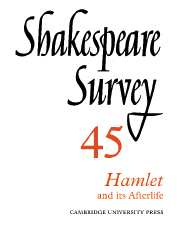Book contents
- Frontmatter
- The Reception of Hamlet
- ‘Hamlet, Revenge!’: The Uses and Abuses of Historical Criticism
- Revision by Excision: Rewriting Gertrude
- Gazing at Hamlet, or the Danish Cabaret
- ‘He’s Going to his Mother’s Closet’: Hamlet and Gertrude on Screen
- Shakespeare Rewound
- Freud’s Hamlet
- ‘Pray you, undo this button’: Implications of ‘Un-’ in King Lear
- Marx and Shakespeare
- Peter Street, 1553–1609: Builder of Playhouses
- Shakespeare Performances in England 1990–1
- Professional Shakespeare Productions in the British Isles, January–December 1990
- 1 Critical Studies
- 2 Shakespeare’s Life, Times, and Stage
- 3 Editions and Textual Studies
- Books Received
- Index
Shakespeare Rewound
Published online by Cambridge University Press: 28 March 2007
- Frontmatter
- The Reception of Hamlet
- ‘Hamlet, Revenge!’: The Uses and Abuses of Historical Criticism
- Revision by Excision: Rewriting Gertrude
- Gazing at Hamlet, or the Danish Cabaret
- ‘He’s Going to his Mother’s Closet’: Hamlet and Gertrude on Screen
- Shakespeare Rewound
- Freud’s Hamlet
- ‘Pray you, undo this button’: Implications of ‘Un-’ in King Lear
- Marx and Shakespeare
- Peter Street, 1553–1609: Builder of Playhouses
- Shakespeare Performances in England 1990–1
- Professional Shakespeare Productions in the British Isles, January–December 1990
- 1 Critical Studies
- 2 Shakespeare’s Life, Times, and Stage
- 3 Editions and Textual Studies
- Books Received
- Index
Summary
This paper proposes to argue that certain relatively little-known screen adaptations of Shakespeare's plays can be shown to exemplify and embody constructive explorations of certain key issues widely recognized as central to the problems of contemporary Shakespeare interpretation. The film-texts in question are marginal to the point of invisibility, either because of their institutional origin and technological medium, or because normative criticism has yet to find a means of reconciling their 'alternative' character with the apparatus of critical analysis and interpretation. The formative context of this argument is shaped by the conviction that there now exists a canonical apparatus of 'Shakespeare on film', authorized by a legitimating body of criticism and scholarship.
The 'Shakespeare-on-film' canon could already be seen in the process of construction in those critical studies which still at present constitute the standard literature in the field: the late Roger Manvell's Shakespeare and the Film (1971, revised 1979), Charles Eckert's edited collection Focus on Shakespearean Films (1972) and Jack Jorgens's Shakespeare on Film (1977). Ground-breaking, pioneering, vitally necessary and perennially useful studies, these books together conspire to privilege a particular canon of great films of great plays by great directors — Olivier, Welles, Kozintsev, Kurosawa, Brook; with a supporting team of somewhat lesser but notable directors in Reinhardt, Mankiewicz, Zeffirelli, Polanski; and a substitute bench of praiseworthy parvenues such as Tony Richardson, Peter Hall, Stuart Burge, Renato Castellani.
- Type
- Chapter
- Information
- Shakespeare Survey , pp. 63 - 74Publisher: Cambridge University PressPrint publication year: 1992
- 3
- Cited by



